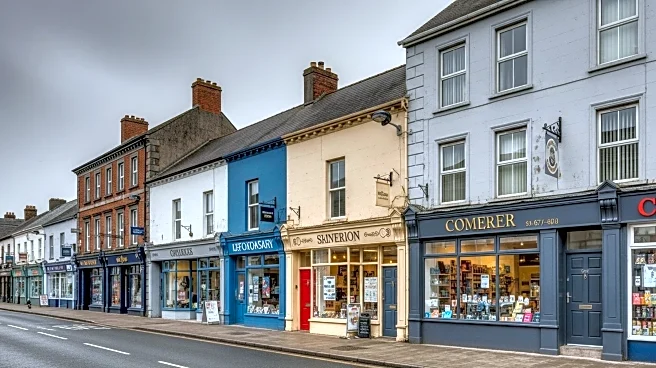What's Happening?
Northern Ireland's high streets are experiencing significant challenges due to economic shifts and changing consumer habits. According to the Department for Communities, approximately 23% of non-domestic units, including shops, pubs, and offices, are unoccupied. This trend has been increasing since 2023, affecting towns with populations over 5,000. Factors contributing to this situation include the rise of online shopping, increased rents, parking charges, higher national insurance payments, and growing utility bills. Specific towns like Larne, Lurgan, and Lisnaskea are facing unique challenges, such as dereliction, traffic congestion, and bank closures, respectively. Efforts are underway to address these issues, including a new bill in the Northern Ireland Assembly aimed at forcing property owners to repair dilapidated buildings.
Why It's Important?
The decline of high streets in Northern Ireland reflects broader economic and societal shifts impacting local communities. The rise in online shopping and increased operational costs are forcing many businesses to close or relocate, leading to economic stagnation in affected areas. This situation poses a threat to local economies, reducing employment opportunities and diminishing community engagement. The potential passage of the Dilapidation Bill could provide a mechanism for revitalizing these areas, but the effectiveness of such measures remains to be seen. The situation underscores the need for strategic investment and policy interventions to support local businesses and maintain vibrant community spaces.
What's Next?
The Northern Ireland Assembly is considering the Dilapidation Bill, which could compel property owners to repair neglected buildings, potentially revitalizing affected high streets. Additionally, local councils are working on regeneration grants to assist landlords in bringing derelict properties back into use. The Department for Infrastructure is assessing a business case for a new signalling project in Lurgan to address traffic congestion caused by increased train services. These initiatives aim to improve the economic landscape and support local businesses, but their success will depend on effective implementation and collaboration among stakeholders.
Beyond the Headlines
The challenges facing Northern Ireland's high streets highlight broader issues of urban planning and economic sustainability. The decline in traditional retail spaces raises questions about the future of community centers and the role of government in supporting local economies. Ethical considerations include the responsibility of property owners to maintain their buildings and the impact of bank closures on community access to financial services. Long-term shifts may include increased reliance on digital commerce and the need for adaptive strategies to maintain vibrant local economies.








